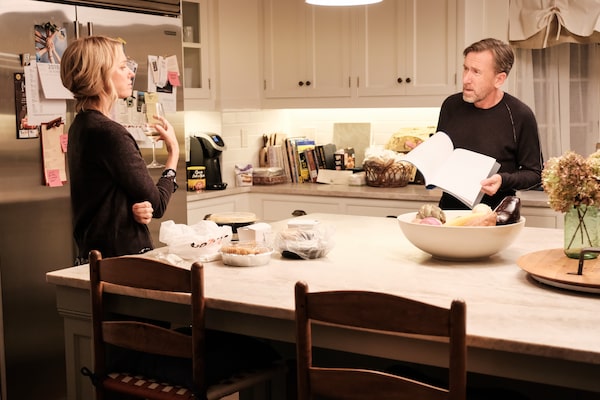Harriet Wilson (Octavia Spencer), Luce (Kelvin Harrison Jr.) and Amy Edgar (Naomi Watts) in Luce.Jon Pack/Handout
- Luce
- Directed by Julius Onah
- Written by J.C. Lee and Julius Onah
- Starring Kelvin Harrison Jr., Octavia Spencer and Naomi Watts
- Classification R; 109 min
What does it mean for white parents to raise a black son committed to, or at least interested in, a radical black politic? What does it mean to embody the very thing your child might need protection from? Weighty, speculative questions such as these are the bread and butter of writer-director Julius Onah’s taut second feature, Luce. Onah’s lauded Sundance darling handles its hypotheticals of race and power with an emotional density that translates generously from its stage source, care of the film’s playwright (and co-writer) J.C. Lee.
Kelvin Harrison Jr. (It Comes At Night) stars as Luce, an all-star high-school student adopted at the age of 7 by his liberal-minded white parents, Amy (Naomi Watts) and Peter (Tim Roth). Much is intoned throughout the film of Luce’s childhood in Eritrea, with references by his parents and schoolteachers to, not only a past entrenched in the horrors of forced violence, but also the years of work and both personal and monetary expense put in by the family who made Luce the poster boy of black accomplishment that he is today.
After writing an essay in the voice of Frantz Fanon, a French West Indian political revolutionary who theorized decolonization as a violent process without exception, Luce falls under the suspicion of one of his teachers, Harriet Wilson (Octavia Spencer). One of the few black teachers at his school (and clearly a woman who has had to face her own struggles in that regard), Wilson is known for the double standards she imposes upon her racialized students. Having found fireworks in the boy’s locker after a less-than-above-board search, what follows is an unyielding examination of the pathologies that breathe life into conceptions of black boys in white America.

Luce is an all-star high school student adopted at the age of 7 by his liberal-minded white parents, Amy and Peter.Jon Pack/Handout
Luce is many things. A slick teen drama that trades in issues of race-based and gendered trauma, a character-led ensemble thriller for our current time and a truth-seeking, if sometimes ambiguous (if not manipulative), notational exploration of race and gender in America. But above all, it is a doorway to questions which should be asked directly of us, as they are here. It takes as its dramatic substance issues of respectability politics, the pressures of expectation placed upon racialized bodies and the coded violence of language that is both shared and divided.
In truth, there is not much this film does not cover; every minute of Luce is saturated with the organicism of its sharp lines of inquiry and its actors here are at their best in their handling of their given materials. Harrison Jr. delivers a performance that churns in its impenetrable multiplicity, exhibiting tight control over a character who physically and emotionally exists in others’ preconceptions (including our own). Watts and Roth play off of each other in such a way that makes palpable the particular iterations of white parenthood – more specifically, the questions surrounding what it means to protect a son who lives in this world as a black boy, and for Watts’s Amy in particular, how the boundaries between parent and child can become blurred in the wake of race-based stress.

Watts and Roth play off of each other in such a way that makes palpable the particular iterations of white parenthood – more specifically, the questions surrounding what it means to protect a son who lives in this world as a black boy.Jon Pack/Handout
The film has an eye that is surely studied, but also limited. “Thought-provoking” are the words which most popularly orbit the critical space of Luce, and Onah’s film is absolutely one that requires your full participation in its extended project of perception. However, the full tenor of this phrase is largely dependent on the makeup of the audiences it refers to. While masterfully directed and adapted to screen, the film will leave those for whom the questions it asks are not hypotheticals wanting more than just politics as dramatic vehicle. Luce underscores the cruelty of grey areas in more ways than one and, above all, is a study of this specific location in and of itself. There is no denying that “hard to ask questions” are ofttimes just that, but it is in trying to elucidate answers to those questions where the truly provocative work lies.
Luce opens Aug. 9
Live your best. We have a daily Life & Arts newsletter, providing you with our latest stories on health, travel, food and culture. Sign up today.